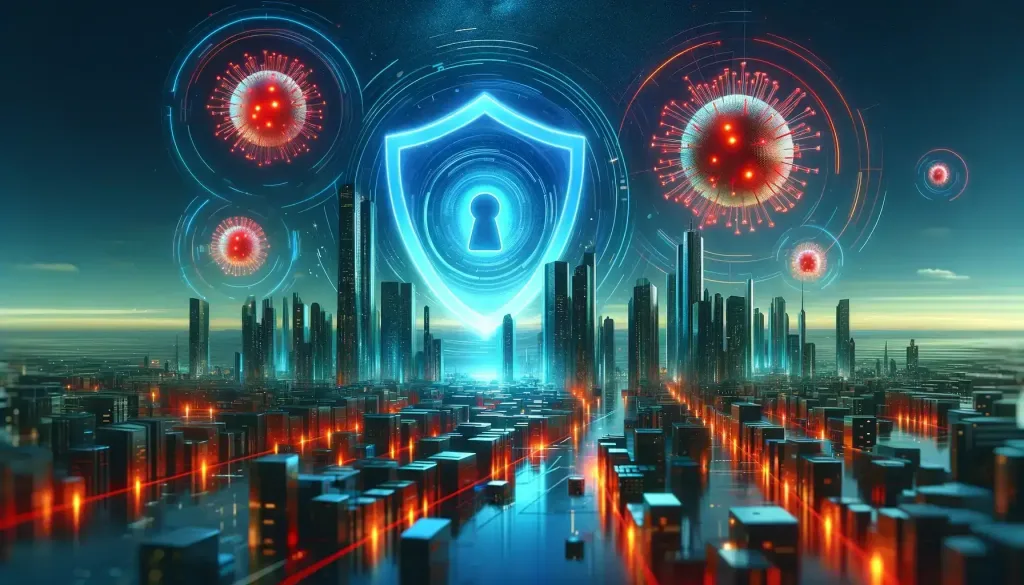Why do you need an antivirus? In the digital age in which we live, our computers are an integral part of our lives. We use them for work, learning, communication and recreation. But like everything we use on a daily basis, our computers also need maintenance and protection. One of the main threats to computers are the viruses, malicious programs that aim to damage the computer or steal information from it, the viruses are diverse and change frequently, so we must have maximum protection against them. Maximum protection begins with understanding the risk, and continues with the installation of a high-quality anti-virus that can protect our computer.
Downloadable antivirus: what does it mean?
Software that aims to protect your computer from viruses and other malicious software. There are different antiviruses, some provide basic protection, and some provide more advanced protection. Downloadable antivirus refers to antiviruses that can be downloaded from the Internet and installed on your computer. The download is a simple and fast process, which allows you to install the antivirus independently. When you download an antivirus, you get the latest version of the software, which contains the most up-to-date virus protection.
How to choose the right antivirus for you?
Choosing the right antivirus for you depends on several factors. First, you need to consider your needs. If you use your computer on a basic basis and don't keep sensitive information on it, a basic antivirus can be enough. If you use your computer for work or study, or if you have sensitive information on your computer, you may want to consider a more advanced antivirus. Second, you should consider your budget. There are free antiviruses, but they often provide limited protection. Anti-viruses that cost money provide more advanced protection, but they also cost more.
Review of the leading antiviruses on the market
 There are several leading antiviruses on the market, including Norton, McAfee, Avast, AVG and more. Each of them offers a variety of protection plans, so you can choose the plan that suits you best. Norton is one of the leading antiviruses, and it offers comprehensive protection against viruses, spyware, network aggression and more. McAfee is also a leading antivirus, and it offers comprehensive and advanced protection, including network aggression protection, spyware protection, virus protection, and more.
There are several leading antiviruses on the market, including Norton, McAfee, Avast, AVG and more. Each of them offers a variety of protection plans, so you can choose the plan that suits you best. Norton is one of the leading antiviruses, and it offers comprehensive protection against viruses, spyware, network aggression and more. McAfee is also a leading antivirus, and it offers comprehensive and advanced protection, including network aggression protection, spyware protection, virus protection, and more.
The 10 best antiviruses and a download link
Norton (Norton AntiVirus): [ Download link ] Kaspersky (Kaspersky Anti-Virus): [ Download link ] Bitdefender: [ Download link ] Avast (Avast AntiVirus): [ Download link ] AVG AntiVirus: [ Download link ] Avera (Avira AntiVirus): [ Download link ] McAfee AntiVirus: [ Download link ] Trend Micro AntiVirus: [download link] Emsisoft Anti-Malware: [download link] Malwarebytes (Malwarebytes Anti-Malware): [download link]
Installing an antivirus: step by step
Installing an antivirus is a simple and quick process. Here are some basic steps that can help you: 1. Select the antivirus you want to install. 2. Visit the antivirus website and click "Download". 3. Open the downloaded file and install the antivirus. 4. After you have installed the antivirus, open it and follow the instructions to set up the protection.
Tips for keeping your computer safe from viruses
No antivirus provides complete protection against viruses, so it is important to take several additional steps to protect your computer: 1. Update your computer frequently. Updates contain fixes for security issues found. 2. Avoid opening infected files or downloading software from unknown sources. 3. Use a quality antivirus and update it frequently.
Why is it important to keep your computer secure?
It is important to keep your computer secure for many reasons. In the digital age, most of our information, including personal and sensitive information, is on our computers. If the computer is not secured, this information can be exposed to people who are not authorized to see it, and this can lead to information theft, ransomware attacks, and even financial fraud. In addition, attackers can exploit unsecured computers to spread malware or carry out cyber attacks. To avoid these situations, we must use up-to-date anti-virus software, update our operating system regularly, avoid suspicious files, and not surf insecure websites. It is also important to use strong passwords and change them frequently. All of these help protect our computer from cyber attacks and keep our information safe.
How to avoid computer hacking?
Preventing computer hacking is very important for protecting our personal and important information. There are several ways to prevent computer hacking. First, it is important to use high-quality antivirus software, which will remove the possible threats to the computer wall. On top of that, you should regularly update the operating system and the software installed on the computer, to make sure that they do not have known security weaknesses that the hacker can take advantage of. In addition, it is important to be careful when receiving emails from unknown sources, which can contain a virus that will attack your computer. If it is a computer connected to an office network, then it is important to keep strong passwords and change them often. And finally, you should protect the computer itself from theft or loss, which can lead to unauthorized access to our information.
Maintaining an updated operating system
Keeping an updated operating system is especially important in the modern age, where the scourge of cyber attacks and computer viruses are a daily reality. When our operating system is updated, we ensure that the security of our computer is as protected as possible from electronic attacks. Each update contains fixes and upgrades to the security mechanisms, as well as performance improvements and new software support. In addition, updates allow the operating system to continue to support new programming and applications that come to light. Therefore, keeping an updated operating system is not only a matter of convenience, but also essential for keeping our computer and information from harm. Today, operating systems are an integral part of our daily lives and a wide variety of technological devices. Operating systems adapt themselves regularly, in order to offer their users the most up-to-date, most reliable and most secure functionality. Maintaining an updated operating system is a task that we must persevere in, as it is the most effective way to ensure the efficiency of our devices, and protect our privacy and the information we store in them. An updated operating system allows users to benefit from new technological advances, improved capabilities and expanded functionality. Also, these updates are improvements in information security, as they regularly correct faults and bugs found in the system, thus helping to protect the device and the information it stores. Beyond that, an updated operating system allows users to enjoy a changing and modern design, which improves the experience of using the device. This design contains improvements to the user interface, graphic design and other visual aids. Maintaining an updated operating system is a process that begins with recognizing the importance of operating system updates, and continues by performing certain actions that ensure the system is kept up to date. These specific actions include, among others: 1. Regular update: updates to the operating system are made regularly, and there are even systems that make the updates automatically. However, it is important to make sure that the system is updated, even if the updates are not performed automatically. 2. Keeping up to date with new versions: As soon as a new version of an operating system is released, it is important to update the system as soon as possible. New versions contain improvements and fixes for problems introduced in previous versions. 3. Virus scanning: maintaining an up-to-date operating system must be complemented with the use of up-to-date anti-virus software, which performs regular scans and helps prevent further attacks. In conclusion, keeping an updated operating system is not only an essential step to ensure our privacy and the security of our information, but also a way to ensure that we can enjoy the full functionality that our devices offer us. If we keep an updated operating system, we can continue to use our devices efficiently, safely and maximally.
Frequently asked questions on the subject
One of the most common questions people ask is "Do I really need an antivirus?" The answer is yes. Although today's operating systems provide some protection against viruses, they do not provide complete protection. It provides an additional layer of protection that can protect your computer from viruses and other malware. In conclusion, maximum virus protection is essential for keeping your computer safe. Downloadable antiviruses provide an additional layer of protection that can protect your computer from viruses and other malware

